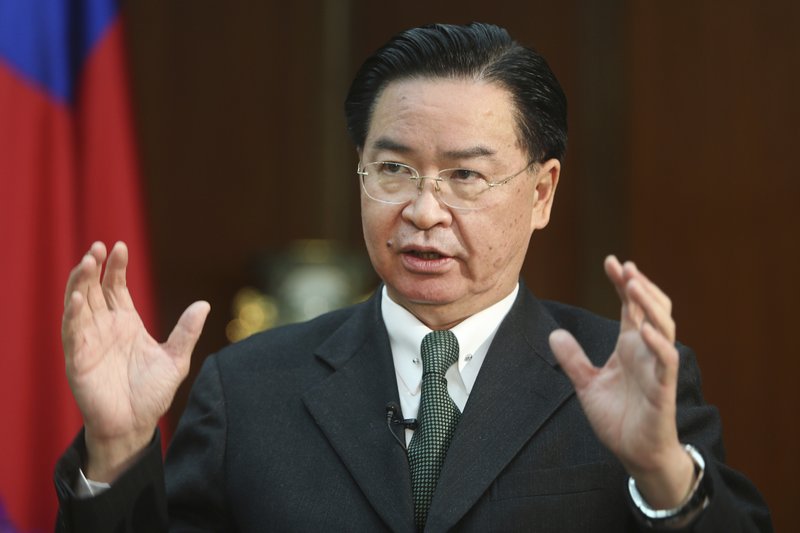TAIPEI, Taiwan -- Taiwan's top diplomat said Tuesday that his government stands with Hong Kong citizens pushing for "freedom and democracy," and would help those displaced from the semiautonomous Chinese city if Beijing intervenes with greater force to quell the protests.
Speaking to The Associated Press in the capital, Taipei, Foreign Minister Joseph Wu was careful to say his government has no desire to intervene in Hong Kong's internal affairs and that existing legislation is sufficient to deal with a relatively small number of Hong Kong students or others seeking to reside in Taiwan.
But he added that Hong Kong police have already responded with "disproportionate force" to the protests. He said that any intervention by mainland Chinese forces would be "a new level of violence" that would prompt Taiwan to take a different stance in helping those seeking to leave Hong Kong.
"When that happens, Taiwan is going to work with the international community to provide necessary assistance to those who are displaced by the violence there," he said.
Chinese paramilitary forces have deployed to the Chinese city of Shenzhen, just outside Hong Kong, since the protests began in June. Neither they nor the thousands of Chinese military troops garrisoned in Hong Kong itself have been deployed to confront the protesters so far.
"The people here understand that how the Chinese government treats Hong Kong is going to be the future way of them treating Taiwan. And what turned out in Hong Kong is not very appealing to the Taiwanese people," Wu said.
China's Communist Party insists that Taiwan is part of China and must be reunited with it, even if by force. Modern Taiwan was founded when Chiang Kai-shek's Nationalists, who once ruled on the mainland, were forced to retreat to the island in 1949, after the Communists took power in the Chinese Civil War.
Beijing has suggested that Taiwan could be reunited under the "one country, two systems" model that applied to Hong Kong after the former British colony was returned to China in 1997. That agreement allowed Hong Kong to keep its civil liberties, independent courts and capitalist system, though many in Hong Kong accuse Beijing of undermining those freedoms under President Xi Jinping.
Taiwanese President Tsai Ing-wen has said that the "one country, two systems" model has failed in Hong Kong and brought the city to "the brink of disorder."
Wu's comments come as Hong Kong police said they defused two large homemade bombs packed with nails and designed "to kill and to maim people" in the latest reported seizure of weaponry during six months of anti-government protests.
Police said the bombs found Monday evening inside a high school on Hong Kong Island were "complete, fully functional and ready to be used."
The origin of the bombs was not clear. The Wah Yan College said the bombs were found in a public area of the school and that there is no evidence linking them to any of its staff or students.
Police said the bombs were radio-controlled, to be triggered with mobile phones. They contained 22 pounds of high explosives and shrapnel that would inflict injury. Their blast could have been felt over a distance of 100 yards or more, police said.
Wu spoke a month before Taiwanese voters go to the polls for presidential and parliamentary elections on Jan. 11.
China severed links with Taiwan's government after Tsai took office in 2016 because of her refusal to accept Beijing's claims on the island. It has since been increasing diplomatic, economic and military pressure on Taiwan.
That includes sending aircraft carriers through the Taiwan Strait -- the most recent transit was last month -- and peeling away Taiwan's few remaining diplomatic allies. Two more, the Solomon Islands and Kiribati, switched their diplomatic recognition to Beijing in September.
A second term for Tsai would see a continuation of Taiwan's tough stance against its much larger neighbor.
Information for this article was contributed by staff members of The Associated Press.
A Section on 12/11/2019
